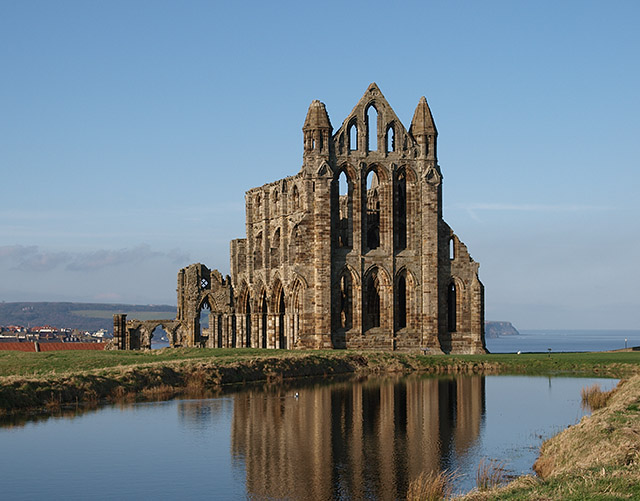Cædmon's Hymn
 Cædmon is the earliest English poet whose name is known. An Anglo-Saxon herdsman attached to the double monastery of Streonæshalch (Whitby Abbey) during the abbacy of St. Hilda (657–680), he was originally ignorant of "the art of song," but according to Bede learned to compose one night in the course of a dream. He later became a zealous monk and an accomplished and inspirational religious poet.
Cædmon is the earliest English poet whose name is known. An Anglo-Saxon herdsman attached to the double monastery of Streonæshalch (Whitby Abbey) during the abbacy of St. Hilda (657–680), he was originally ignorant of "the art of song," but according to Bede learned to compose one night in the course of a dream. He later became a zealous monk and an accomplished and inspirational religious poet.
.jpg) The only known survivor from Cædmon's oeuvre is his Hymn (audio version). The poem is known from twenty-one manuscript copies, making it the best-attested Old English poem after Bede's Death Song, and the best attested in the poetic corpus in manuscripts copied or owned in the British Isles during the Anglo-Saxon period.
The only known survivor from Cædmon's oeuvre is his Hymn (audio version). The poem is known from twenty-one manuscript copies, making it the best-attested Old English poem after Bede's Death Song, and the best attested in the poetic corpus in manuscripts copied or owned in the British Isles during the Anglo-Saxon period.
ORIGINAL VERSION
Nu scilun herga hefenricæs uard
metudæs mehti and his modgithanc
uerc uuldurfadur sue he uundra gihuæs
eci dryctin or astelidæ.
he ærist scop ældu barnum
hefen to hrofæ halig sceppend
tha middingard moncynn&ealig;s uard
eci dryctin æfter tiadæ
firum foldu frea allmehtig
MODERN ENGLISH TRANSLATION
Now let me praise the keeper of Heaven's kingdom,
The might of the Creator, and his thought,
The work of the Father of glory, how each of wonders
The Eternal Lord established in the beginning.
He first created for the sons of men
Heaven as a roof, the holy Creator,
Then Middle-earth the keeper of mankind,
The Eternal Lord, afterwards made,
The earth for men, the Almighty Lord.

2 comments:
Lovely, lovely. Thank you for posting this.
Thanks for reading, Barbara! There's a simplicity to his work that I particularly enjoy.
Post a Comment